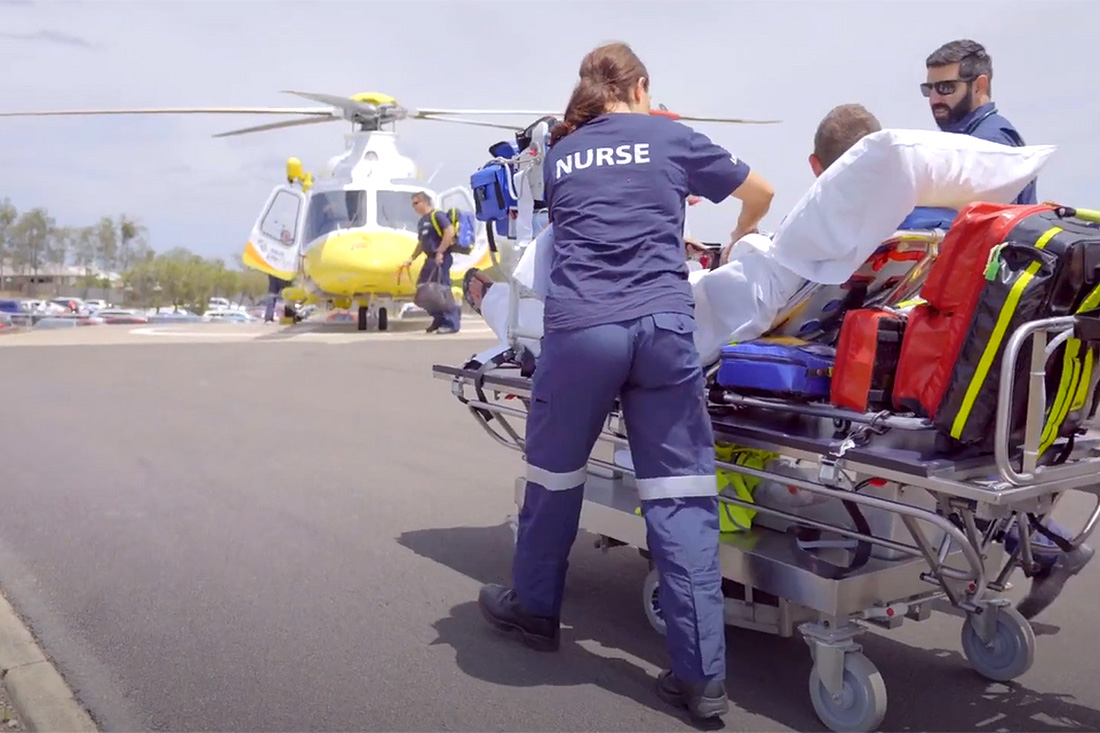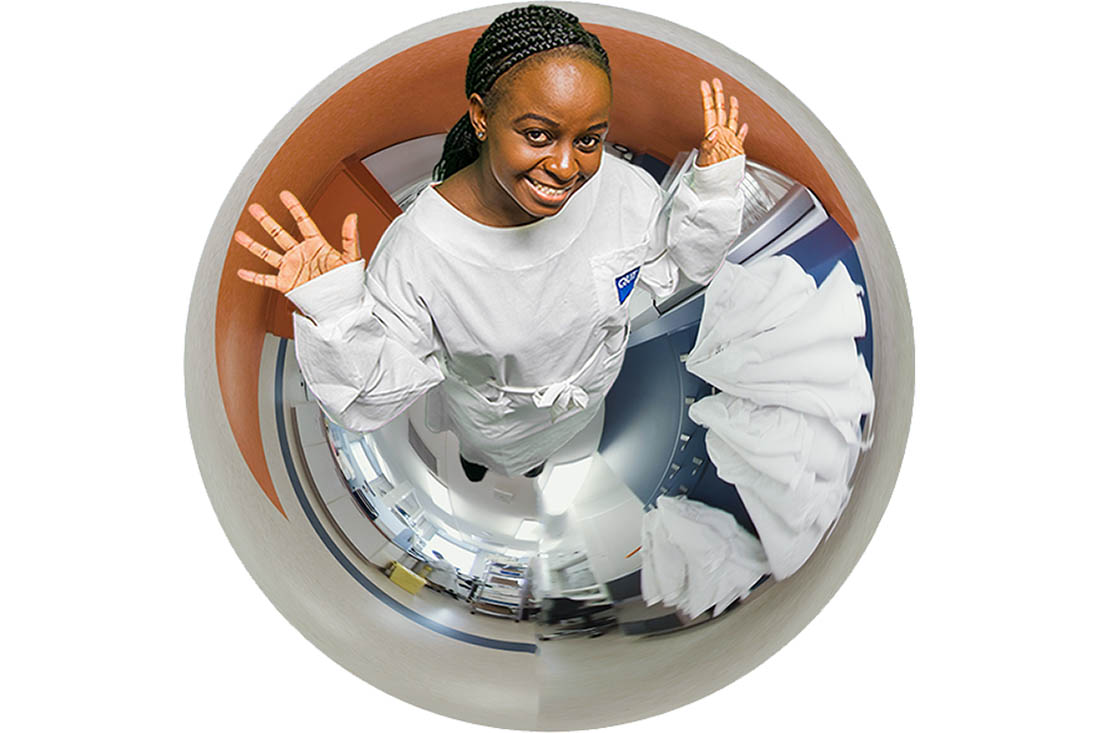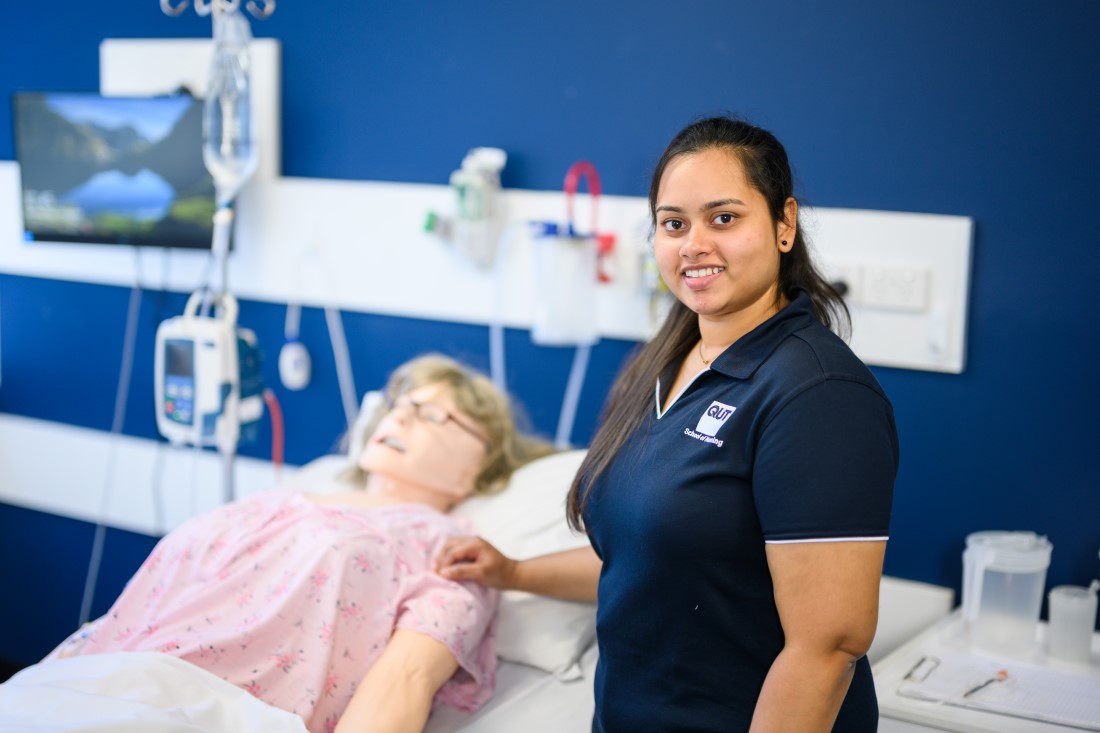High-impact nursing
Find out how studying nursing at QUT can lead to a rewarding career in emergency nursing.
Make a real difference
Mel Toh shares her experiences of nursing and what led her to work as a screening nurse with Mercy Ships.
Experience science in 360 degrees
When you study with us, you’ll be working in real clinical settings and simulation environments from your first year. Explore our 360° environments and see what real-world health sciences can mean for you.
A rewarding career that could take you anywhere
Nursing offers me a flexible career and a chance to contribute to the community. Global recognition of the nursing qualification allows me to work in most countries in the world. QUT’s weekly clinical practical sessions gave me the confidence to learn and practise clinical procedures. They equipped me with the skills to perform well on clinical placements.
Becoming a well-trained and skilful nurse
I have always wanted to work as a healthcare professional and I have always loved biology, anatomy, and science. I chose to study the nursing program at QUT because it is an accredited program in all of Australia and has a reputation of producing well-trained and skilful nurses to the health industry. I particularly enjoy the practical parts of the course - I had on-campus practical learning units and off-campus clinical work experience units as part of my course.
Bachelor of Nursing student from Sri Lanka
A rewarding career that could take you anywhere
Nursing offers me a flexible career and a chance to contribute to the community. Global recognition of the nursing qualification allows me to work in most countries in the world. QUT’s weekly clinical practical sessions gave me the confidence to learn and practise clinical procedures. They equipped me with the skills to perform well on clinical placements.
High-impact nursing
Find out how studying nursing at QUT can lead to a rewarding career in emergency nursing.
Make a real difference
Mel Toh shares her experiences of nursing and what led her to work as a screening nurse with Mercy Ships.
Experience science in 360 degrees
When you study with us, you’ll be working in real clinical settings and simulation environments from your first year. Explore our 360° environments and see what real-world health sciences can mean for you.









Highlights
- Join a growing sector and become a nurse after 2 years of study if you have a previous degree
- Be in demand with a masters that focusses on strengthening employability skills in your final year
- Benefit from more than 800 hours of clinical placement, and additional theory units
- Prepare yourself for a career in public and private hospitals, nursing homes, community health, hospital in the home, school health, pathology laboratories, alcohol and drug services and the Australian Defence Force.
Highlights
- Join a growing sector and become a nurse after 2 years of study if you have a previous degree
- Be in demand with a masters that focusses on strengthening employability skills in your final year
- Benefit from more than 800 hours of clinical placement, and additional theory units
- Graduates satisfy the academic requirements for admission as a professional member to the Australian College of Nursing.
- Prepare yourself for a career in public and private hospitals, nursing homes, community health, hospital in the home, school health, pathology laboratories, and alcohol and drug services.
Why choose this course?
The Master of Nursing – Entry to Practice provides a pathway to a nursing career for applicants with a bachelor degree in any area other than nursing. Students are awarded the equivalent of one year of advanced standing (credit) and complete the course in two years instead of three. The masters qualification positions you as a future leader in healthcare, preparing you to navigate complex health care challenges, and equipping you with clinical skills, research expertise and the capabilities to lead service provision .
Our course content reflects emerging trends in healthcare and nursing practice that have been identified through consultation with industry partners, discipline experts and research literature.
The masters embeds a bioscience unit within the first semester, grounding students in essential knowledge of human anatomy and physiology. This unit removes the need to study bioscience as a prerequisite for course entry and ensures the quality of learning in this area as a foundation for nursing practice based learning. Subsequent studies will also build your knowledge in pathophysiology and will introduce you to professional nursing practice and contemporary healthcare service.
You will go on to develop an understanding of pharmacology with an emphasis on quality use of medicines. On-campus studies are complemented by opportunities to apply nursing theory to clinical practice in the simulated hospital facility and in clinical placements off campus.
Graduates of this degree are prepared to excel in a profession where the scope of practice is expanding and there are greater responsibilities for delivery of more complex interventions in a range of healthcare settings and across diverse populations.
Our course recognises the increased demand for graduates who understand the importance of person-centred care and have the capacity to engage people as informed partners in their health care.
Real-world learning
The Master of Nursing – Entry to Practice facilitates students’ learning through authentic, real-world experiences supported by the latest theory and knowledge of nursing practice. You’ll learn by examining case studies, through authentic workplace scenarios and through real patient interactions. You’ll have opportunities to develop your skills in simulations before putting them into practice in clinical placements. You will learn a culturally-safe, person-centred approach to nursing and gain the tools to develop an evidence-based, reflective practice skill set.
With purpose-built, on-campus facilities that replicate the hospital environment, technology, equipment and scenarios, you will develop confidence and skills to work in a range of healthcare environments. Our Clinical Simulation Centre contains operational hospital rooms where you will practise with real equipment and the latest technology in a simulated environment.
Your experience in real industry settings begins during first semester of first year and continues with clinical placement experience every semester thereafter. You will complete more than 800 hours of placement, with extensive support that includes continual feedback on your performance from clinical facilitators, and mentoring relationships with registered nurse mentors.
Explore this course
This course will not only develop your clinical skills but will teach you to analyse and apply scientific knowledge within the context of nursing and related disciplines. You will be equipped with critical thinking and clinical reasoning skills, so that you can evaluate your practice to provide high-quality, evidence-based, person-centred care.
QUT is committed to supporting students to become ethical, socially inclusive and culturally safe practitioners. You will hone your communication skills and professional capabilities so that you can practice independently or as part of a team in a range of health service settings. We will help you develop the skills to lead yourself and others so that you can achieve positive outcomes for individuals and communities.
Inherent requirements
There are some essential skills and abilities you'll need to perform to meet the core learning outcomes of your course or unit. They're not something you need to get in to the course, but they'll be assessed throughout your course, and they'll be required for you to succeed in your career when you graduate. Find out more about the inherent requirements for the Master of Nursing – Entry to Practice.
Mandatory notifications
While you are registered as a student with the NMBA, QUT has an obligation to notify AHPRA if you have an impairment that may place the public at substantial risk of harm when undertaking clinical training. Find out more about the guidelines for mandatory notifications.
Work Integrated Learning
During this course, you will be required to complete a minimum of 800 hours of clinical placement.
Careers and outcomes
Nursing is one of the most diverse health professions and provides employment opportunities in Australia and overseas.
Employment can be in general and specialist areas such as emergency, paediatrics or mental health, and in areas of health care beyond the traditional hospital ward including community health, in-home care, school health, pathology laboratories, alcohol and drug dependence, and the armed services.
Many nurses complete further study and become specialists in acute care nursing, cancer nursing, emergency nursing, intensive care nursing, mental health nursing, or paediatric, child and youth health nursing.
Professional recognition
NS89 Masters of Nursing—Entry to Practice is recognised by the Australian College of Nursing as satisfying the academic requirements for admission as a professional member. This course is accredited as a Nursing Pre-registration course with the Australian Nursing and Midwifery Accreditation Council / Nursing and Midwifery Board of Australia.
Student registration
QUT automatically registers students enrolled in this course with the Nursing and Midwifery Board of Australia in accordance with the Health Practitioner Regulation National Law Act 2009. Details about student registration are available from the Australian Health Practitioner Regulation Agency
- ATAR/selection rank threshold
- 93.00
These thresholds are the lowest adjusted scores to which QUT made an offer in Semester 1, 2024.
Don't have a ATAR/selection rank?
- Course code
- NS89
- QTAC code
- 425901
- CRICOS code
- 107928G
-
- Kelvin Grove
-
- Kelvin Grove
- 2 years full-time
- 4 years part-time
- 2 years full-time
- February
- February
- Applications for 2025 have closed. Applications for 2026 are open.
Entry requirements
You must have a completed recognised bachelor degree (or higher qualification), not in nursing, in 2014 or more recently.
If you completed your degree (or higher qualification) earlier than 2014 you must provide evidence with your QTAC application of five years full-time (or equivalent) professional work experience gained in 2014 or more recently.
Selection ranks
You will be considered solely on the basis of the selection ranks from all of your prior degree and higher studies you may have undertaken. Your other qualifications and experiences may be allocated selection ranks for entry to other QUT courses, but will not be considered for this course.
Find out more about how to Apply with Higher Education Study
Additional entry requirements
You must have attended and satisfactorily completed at least 6 years of primary and secondary education taught and assessed solely in English. At least two years of this education must have been between grades 7 and 12. This education must have been completed in one of the following countries:
- Australia
- Canada
- New Zealand
- Republic of Ireland
- South Africa
- United Kingdom
- United States of America
If you have not met these educational requirements, you are required to provide evidence of an acceptable English Language test (refer below).
English language proficiency
QUT requires you to demonstrate you can speak, write, read and comprehend academic English to a specified standard.
QUT's English proficiency requirements for this course are:
- IELTS (Academic): 7.0 or better overall with no sub-score below 7.0
- PTE: 65 or better overall with no sub-score below 65
- TOEFL (IBT): 98 or better overall with a writing sub-score of 27 or better, listening and reading sub-scores of 24 or better, and speaking sub-score of 23 or better
- Occupational English Test (Nursing Profession) with a minimum score of 350 in each component.
The test must have been completed within two years prior to the proposed course start month.
Adjustments to your selection rank
Any adjustments you receive to your selection rank will be applied to this course.
Find out if you're eligible for an adjustment to your election rank
Deferment
You can't defer your offer in this course. You must start in the semester you apply for.
Entry requirements
Prior bachelor degree (or higher qualification) in any discipline (not nursing).
You must have a completed recognised bachelor degree (or higher qualification) not in nursing completed within the past 10 years prior to course commencement with a grade point average (GPA) or 4.00 or higher (on QUT's 7 point scale).
If your bachelor degree was awarded more than 10 years ago you will be eligible for entry if you have 5 years of professional work experience (within 10 years oof course commencement). If you are applying on the basis of work experience must submit a detailed CV, position details and employment statements.
Prior bachelor degree in nursing
You must have a completed recognised overseas nursing bachelor degree completed within the past 10 years with a minimum grade point average (GPA) of 4.00 (on QUT's 7 point scale).
If your overseas nursing bachelor degree was awarded more than 10 years ago will be eligible for entry if you have one of:
- evidence of current registration as a nurse; or
- evidence of work experience as a registered nurse no more than five years prior to the planned date of course commencement. If you are applying on the basis of work experience must submit a detailed CV, position details, and employment statements.
2025 Applications Closed
The course has filled for 2025 entry. Applications for 2025 entry can no longer be submitted. Applications for 2026 are open.
Limited places
This course has limited places available. Apply and accept your offer early so QUT can confirm you have a place in the course.
Minimum English language requirements
We accept English language proficiency scores from the following tests. Tests must be taken no more than 2 years prior to the QUT course commencement.
| English Test | Overall | Listening | Reading | Writing | Speaking |
|---|---|---|---|---|---|
| IELTS Academic | 7 | 7 | 7 | 7 | 7 |
| TOEFL iBT | 98 | 24 | 24 | 27 | 23 |
| Pearson PTE (Academic) | 65 | 65 | 65 | 65 | 65 |
| Occupational English Test (Nursing Profession) | -- | 350 | 350 | 350 | 350 |
Course requirements
There are requirements that you will need to meet as a student in this course. You will need to identify these requirements and ensure you allow sufficient time to meet them. Some of these requirements have associated costs.
This course has a number of compulsory clinical practice units. One of these units will require students to undertake a four week clinical placement experience scheduled during the November - February summer break prior to the commencement of the final year of studies.
Find out more about additional course requirements and costs.
Inherent requirements
There are some essential skills and abilities you'll need to perform to meet the core learning outcomes of your course or unit. They're not something you need to get in to the course, but they'll be assessed throughout your course, and they'll be required for you to succeed in your career when you graduate. Find out more about the inherent requirements for the Master of Nursing – Entry to Practice
Mandatory notifications
While you are registered as a student with the NMBA, QUT has an obligation to notify AHPRA if you have an impairment that may place the public at substantial risk of harm when undertaking clinical training. Find out more about the guidelines for mandatory notifications.
Your actual fees may vary depending on which units you choose. We review fees annually, and they may be subject to increases.
2025 fees
2025: CSP fees available from September
2025 fees
2025: Available from July
2024 fees
2024: CSP $5,700 per year full-time (96 credit points)
2024 fees
2024: $38,600 per year full-time (96 credit points)
Student services and amenities fees
You may need to pay student services and amenities (SA) fees as part of your course costs.
HECS-HELP: loans to help you pay for your course fees
You may not have to pay anything upfront if you're eligible for a HECS-HELP loan.
You can apply for scholarships to help you with study and living costs.
Keep up to date
QUT courses for you
Like to save your courses?
Please enter your first name and email so we can save your courses for you